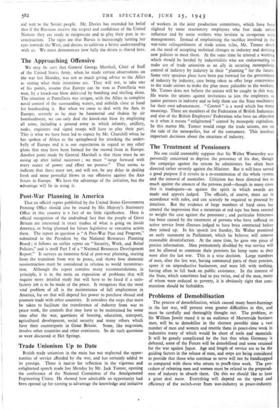The Treatment of Pensioners
No one could reasonably suppose that Sir Walter Womersley was personally concerned to deprive the pensioner of his due, though the campaign against the system he administers has often been directed rather severely against the Minister. But it will have served a good purpose if it results in a re-examination of the whole system and the removal of anomalies. Criticism has been directed not so much against the amount of the pension paid—though in many cases this is inadequate—as against the spirit in which awards are made -and appeals judged. The officials, of course, must act in accordance with rules, and can scarcely be required to proceed by intuition. But the evidence of large numbers of hard cases has created the impression that a mountain of red tape has been erected to weight the case against the pensioner ; and particular bitterness has been caused by the treatment of persons who have suffered on active service from illnesses judged to have been contracted before they joined up. In his speech last Sunday, Sir Walter promised an early statement in Parliament, which he believes will remove reasonable dissatisfaction. At the same time, he gave one piece of precise information. Men permanently disabled by war service will not be allowed to commute their pensions for lump sums as they were after the last war. This is a wise decision. Large numbers of men, after the last war, having commuted parts of their pension, spent it on unproductive businesses, and were left with nothing, having often to fall back on public assistance. In the interest of the State, which sometimes had to pay twice, and of the men, many of whom were reduced to poverty, it-is obviously right that com- mutation should be forbidden.






























 Previous page
Previous page